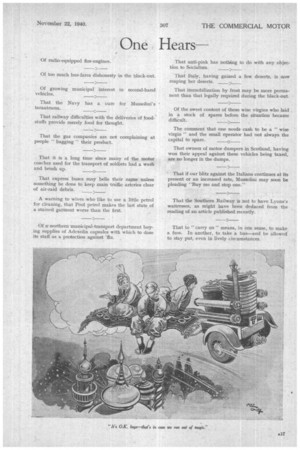One Hears
Page 19

If you've noticed an error in this article please click here to report it so we can fix it.
Of radio-equipped fire-engines.
Of too much bus faresdishonesty in the black-out.
Of growing municipal interest in second-hand vehicles.
That the Navy has a cure for Mussolini's tarantrums.
That railwayrailway difficulties with the deliveries of foodstuffs provide merely food for thought.
That the gas companies are not complaining at people " bagging" their product.
That it is a long time since many of the motor coaches used for the transport of soldiers had a wash
and brush up.
That express buses may belie their name unless something be done to keep main traffic arteries clear of air-raid debris.
A warning to wives who like to use a little petrol for cleaning, that Pool petrol makes the last state of a stained garment worse than the first.
Of a; northern municipal-transport department buying supplies of Adexolin capsules with which to dose its staff as a prcicection against 'flu. , That anti-pink has nothing to do with any objection to Socialism.
That Italy, having gained a few, deserts, is now
reaping her deserts.
That immobilization by frost may be more permanent than that legally required during the black-out Of the sweet content of those wise virgins who laid in a stock of spares before the situation became difficult.
The comment that one needs cash to be a "wise virgin" and the small operator had not always the capital to spare.
That owners of motor dumpers in Scotland, having won their appeal against these vehicles being taxed, are no longer in the dumps.
' That if our blitz against the Italians continues at its present or an increased rate, Mussolini may soon be pleading "Buy me and stop one."
That the Southern Railway is not to have Lyons's waitresses, as might have been deduced from the reading of an article published recently.
That to "carry on" means, in one sense, to make a fuss. In another, to take a bus—and be allowed to stay put, even in lively circumstances.




















































